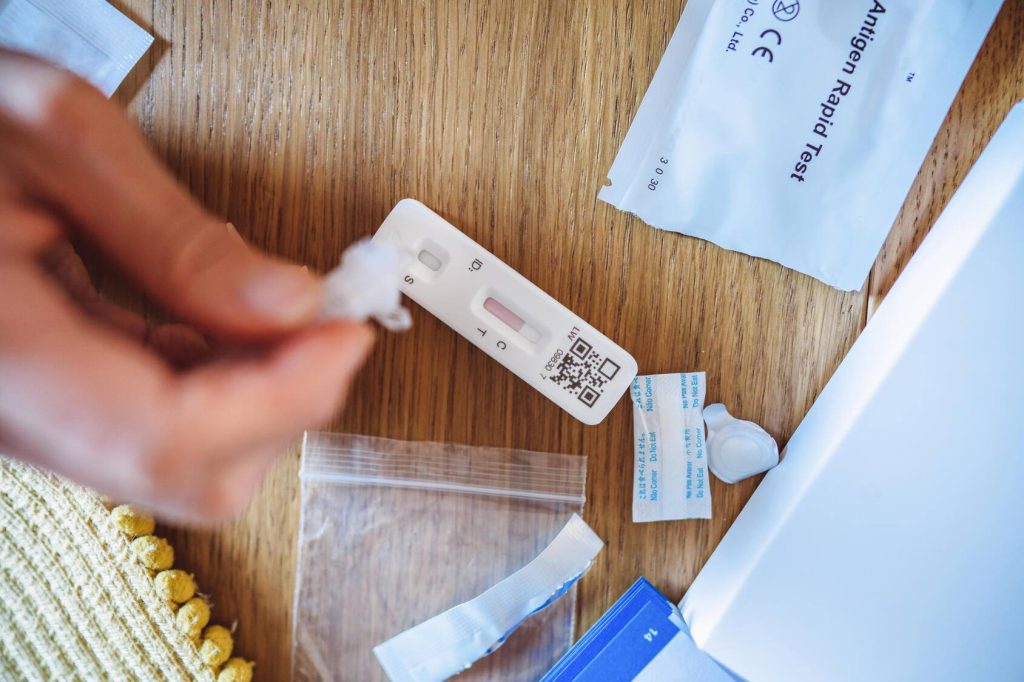-
Health & Wellness
At-home COVID-19 tests: A Mayo Clinic expert answers questions on expiration dates and the new variants

At-home COVID-19 tests allow you to collect your sample and detect active COVID-19 infections.
But what if you have at-home COVID-19 tests nearing expiration or expired on your shelf?
Matthew Binnicker, Ph.D., director of the Clinical Virology Laboratory at Mayo Clinic, says companies set the original test dates arbitrarily due to these diagnostic at-home tests being developed rapidly. So, check your boxes before you toss them.
“Now that we are 3 1/2 years into the pandemic, those manufacturers have had the opportunity to go back and assess the test performance over prolonged periods of time. And they've updated the expiration dates in many cases,” says Dr. Binnicker.
His first recommendation if you have tests at home is to search the Food and Drug Administration (FDA) website for information on updated expiration dates.
"If you take a test that is beyond the expiration date, and the test is positive, that's likely a reliable result, especially if you have a respiratory illness. If you get a negative result from a test that is beyond the expiration date, I'd recommend making sure the test doesn't have an extended expiration date. And if it's beyond that, then definitely go out and get another test or go in and have a healthcare provider collect a swab for a lab-based test before you rule out COVID-19," Dr. Binnicker says.
Watch: Dr. Matthew Binnicker talks about at-home COVID-19 tests
Journalists: Broadcast-quality soundbites are available in the downloads at the bottom of the posts. Please courtesy: "Matthew Binnicker, Ph.D./Laboratory Medicine and Pathology/Mayo Clinic."
Can at-home tests detect current strains of COVID-19?
"Yes, they should detect the currently circulating strains of COVID-19. The good news is that most of the changes in the virus with these new variants are in the spike protein, which is the part of the virus that binds to the cells. And the protein these antigen tests are looking for is a different protein where not as many mutations occur. So that allows us to confidently say that these tests should pick up the circulating strains," says Dr. Binnicker.
Testing positive
Are you contagious if you test positive for COVID-19? Most likely, says Dr. Binnicker.
"When an at-home antigen test is positive, it means that that person is still shedding or excreting a high amount of viral protein. In most cases, that means that the person is shedding a high amount of virus, and likely a high amount of virus that could be spread from one person to another," he says.
He says if you get a positive at-home antigen test, consider yourself at risk of spreading the virus to others.
Testing negative
Dr. Binnicker says testing at home is recommended if you experience COVID-19 symptoms. If it comes back positive, you likely have a COVID-19 infection. But what if you have symptoms and the test comes back negative?
"If your test comes back negative at home, and you still have those typical symptoms of COVID-19 — sore throat, cough, fever, body aches — that's when I'm recommending that people go in to see their healthcare provider, get a swab collected that can be sent to a lab for a PCR-based test. That will give us the most reliable information on whether you truly have, or don’t have, COVID-19," says Dr. Binnicker.
When should you test for COVID-19?
Dr. Binnicker says there are few instances recommended for testing.
- If you develop symptoms such as fever, cough, sore throat, runny nose or body aches.
- If you've spent time with someone with a confirmed diagnosis of COVID-19.
- If you plan on visiting a person at high risk of severe illness. That includes a person with cancer, an older adult or someone taking medications that suppress their immune system.
He says if you've been exposed to the virus, don't test immediately.
"My recommendation is to wait a few days, don't go right home and take a test because it won't have been enough time for the virus to reach levels that will trigger antigen tests to be positive. Typically, wait three days after an exposure and then take a test. If it's negative, consider taking another test the following day or 48 hours from then; typically, by day five after exposure, you're likely in the clear if you test negative over that timeframe," he says.
Temperatures and at-home COVID-19 tests
With the many fluctuating temperatures across geographic areas, can these tests be affected by high heat or cold temperatures? The information packets that come with at-home antigen tests should offer storage condition information as determined by the FDA. That's where reading the fine print can help.
"If you're in an area that has experienced subzero weather or temperatures well above 100, like many parts of the country have during the summer months, it is always a good idea to check the packet that comes with a test to look for the acceptable storage conditions," says Dr. Binnicker.
Related post:
Related Articles







